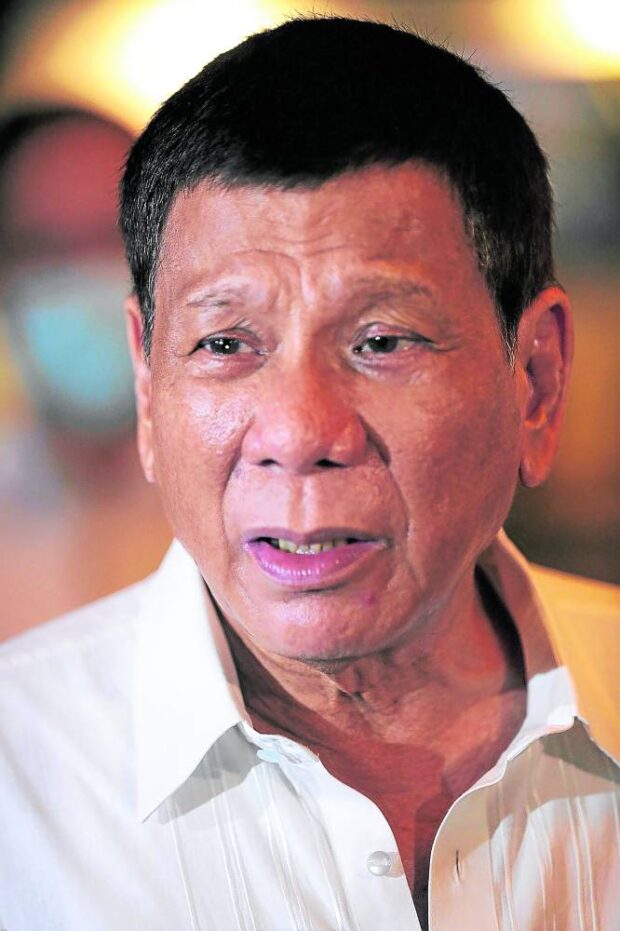
Former president Rodrigo Roa Duterte (INQUIRER FILE PHOTO / GRIG C. MONTEGRANDE)
MANILA, Philippines – Former President Rodrigo Duterte said the accusations of ACT Party-list Rep. France Castro against him “is pure speculation, if not altogether improbable or manifestly absurd.”
Duterte, through his representative on Friday submitted his counter-affidavit before the Quezon City Prosecutor’s Office, his response to the grave threat complaint of Castro.
He subscribed his affidavit in Davao City.
Duterte is facing a complaint for grave threat under Article 282 of the Revised Penal Code and Section 6 of the Cybercrime Prevention Act of 2012 for the statements he made over a television program at Sonshine Media Network International (SMNI) where he talked about the confidential fund of his daughter, Vice President Sara Duterte.
Castro, in her complaint, said Duterte made several insinuations linking her to the communist armed movement without any proof.
But Duterte said he was merely recounting his conversation with his daughter, Vice President Sara Duterte.
“The alleged threatening statements were not even addressed to complainant Castro or to any individual as I was simply reciting the story of my talk with Inday Sara to the program viewers,” Duterte said.
In his Gikan sa Masa, Para sa asa program at SMNI that aired October 11, 2023, Duterte talked about his daughter’s plan of using her office’s confidential funds for a soft revival of the Reserve Officers’ Training Corps (ROTC) program.
He said the vice president should be frank to Congress, particularly Castro that she needs the confidential funds to stop the Communist insurgency.
“But your first target there, using your intelligence funds, is you, France, you Communists who I want to kill. I asked her to tell them that, but she refused, saying, ‘You know Pa, if I did that, they might harass the PMTs (Philippine Military Training institutions),’” he added.
Duterte argued that taking into account the context in which his statements were uttered, :”the same can hardly be considered as a declaration of my purpose or intention to harm complainant Castro.”
On another episode of Gikan sa Masa, Duterte said he only mentioned Castro’s name in-passing while venting out his frustration at the Communist movement.
He said: “Do not think, France na you have already-na may armor kana dahil congresswoman ka, member ng Congress, na hindi ka na-na you are no longer-na hindi ka na vulnerable sa galing ng karami namatay dyan na sundalo pati pulis dahil sa inyo.”
Duterte added that he never heard Castro and her allies condemning the killing of policemen, soldiers and village officials.
“If you do not cooperate or your are not with them, or you are a staunch sa government worker, papatayin ka talaga. Yun ang trabaho ng bata-bata ni France. Kaya ikaw France, how do you solve the problem now? Kaya yun statement ko yun Komunista dapat patayin, Kasali ka dapat,” Duterte said in his Gikan sa Masa program.
But Duterte, in his counter-affidavit, said: “There was never any deliberate intent on my part to single out and threaten complainant Castro. My remarks were made out of frustration against the entire organization, and while complainant Castro’s name may have been mentioned in passing, there was no portion in the interviews wherein I directly and deliberately threatened her.”
Duterte said what Castro mentioned in her complaint were snippets only of the more than three hours of the program and related it to extrajudicial killings, illegal arrests, and even his supposed influence over the military and police.
“Perhaps they found it opportune that I am no longer a public official entitled to immunity from suit, thus allowing themselves to take advantage of trivial and measly concerns in order to retaliate,” Duterte said.
To be able to be prosecuted for grave threat, all the elements must be present: the offender threatened another person with the infliction upon their person, honor or property of any wrong; such wrong amounted to a crime; the threat was not subject to a condition, and the threat was committed with the use of information and communication technologies.
In this case, however, Duterte said that aside from quoting the interview, there was no other evidence presented to support Castro’s allegations.
“Thus, it is pure speculation, if not altogether improbable or manifestly absurd, to suppose that any of the essential elements of the crime charged against me are present as to warrant the filing of an information in court,” Duterte said.
He added that it is basic that mere allegations are not evidence.
“Hence, charges based on mere suspicion and speculation should not be given any credence,” he added as he asked the prosecutor to dismiss the case against him.